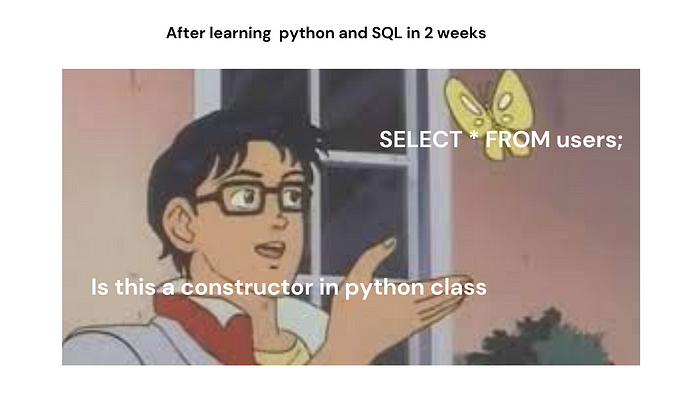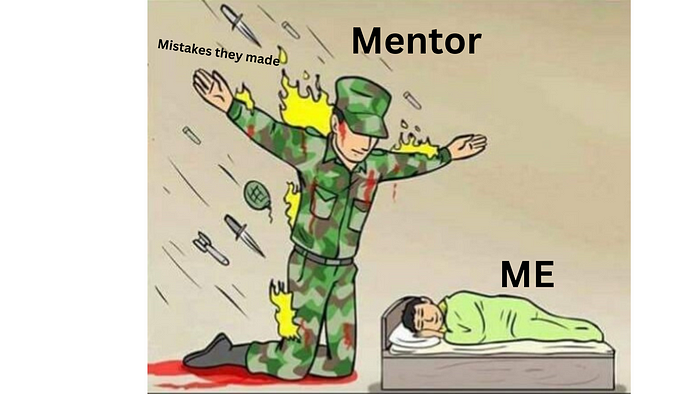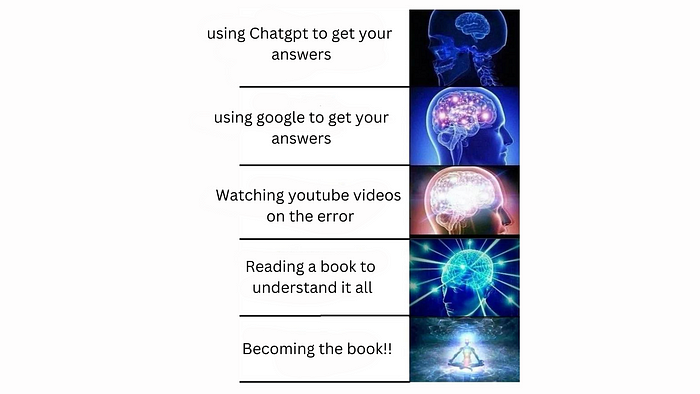Apr 9
/
Michael Dagogo George
10 Things I Wish I Knew Before Entering Tech
Starting your journey in tech is quite easy, there are so many free courses out there to help you get started, so many MOOC platforms(Massive Open Online Courses (MOOCs) are free online courses available for anyone to enroll) that provide courses, YouTube videos from top universities, information about so many things have become accessible all in the palm of your hands.
With all these readily available, why do people still fail achieving a career in the tech industry, sometimes the limitations are ourselves. Here are things I wish I knew before career in tech.
1. Don’t embark on tech without a steady source of income
I know this might not apply to everyone since some countries provide unemployment benefits but in most countries you can’t start out any career with your bank account on life support. Few reasons why you need money to fully pursue a career in tech;
- First and most important reason, YOU NEED TO EATTTT!!!. Imagine chasing your dreams on an empty stomach, your dreams will chase you to the nearest job opening.
- Quality tutorials cost money. You can only go so far with freebies but there is a structure in paid courses that really helps.
- Being realistic, you might not get a tech job in your first year of embarking on the journey but that’s okay, your normal job will save you until you get to the job of your dreams.

2. Don’t rush
It’s common to see posts on Twitter and LinkedIn that says “become a data analyst in 3 months with this roadmap” then the roadmap involves learning statistics for 1 week, python for 2 weeks, excel for 2 days, power bi for 3 days, SQL for 1 week, data cleaning and modelling for 1 week and so on. Needless to say, you won’t assimilate much rushing like that.
People spend years in school learning statistics, you can learn python syntax in 2 weeks but you can’t think like a problem solver in python within that time frame unless if you’ve had programming experience prior to it. Take your time to learn things, understand concepts, build with it, soak in it, where are you rushing to, to get a job? No on will hire you if you can’t add value to their company and even if you want to be an intern you still need a good enough depth in basic knowledge to be considered.

3. Avoid tutorial hell/loop
Yesterday you saw a free Udacity Scholarship on HTML and CSS basics, you applied. 2 weeks later, you applied for financial aid on Coursera for HTML and CSS basics. A Udemy course for HMTL and CSS basics is on sale, you purchase it. 2 months later you realized that you have been learning the same thing over and over again without progressing and this is a real problem faced by beginners in any field, sometimes you won’t be able to realize it until someone points it out for you.
Some people enter this loop of learning the same thing over and over because they believe they must master it all before moving to the next stage but that is not the case here. Its okay to be in the dark sometimes, perhaps the light is in the next stage you just have to be confident enough to admit that you can’t learn it all but you’re willing to do your best.
4. Don’t chase certifications, build instead
At a point we’ve all thought certifications would help us or something to boast about to our peers, maybe to make us feel some sort of accomplishment or we just thought it would hold a certain weight on our CV. Well you’re not exactly wrong or exactly right, there are certifications that are necessary for some jobs but when it comes to tech a recruiter would rather interview someone with hands on experience than one with a certification.
Certain cloud certifications are worth it as they do not just set you apart from the crowd, they also show that you passed a proctored exam(not an accomplishment since some of you have an IQ of 15 squared without even knowing).
When you build, you make mistakes, you learn from those mistakes and you get better.

5. Stay on one path
You’re learning Data analysis, Backend development and Customer Support, why, they have nothing in common, no useful intersecting lines, their Venn diagram circles don’t overlap.
Reasons why you should stay on one career path;
- Diluted progress: Multiple career paths at once deprives you from getting to your destination on time or at all. When you divide your efforts among multiple career paths, progress in each field may be slower compared to focusing on one path at a time. It takes time to build a solid foundation, gain experience, and establish connections in any given field. By spreading yourself too thin, you may find it challenging to make significant strides or achieve the level of success you desire.
- Lack of focus: Each career requires a significant amount of time and effort to master, and dividing your attention between multiple paths can make it challenging to develop expertise in any one area.
- Time and energy constraints: Juggling multiple paths can result in burnout or feeling overwhelmed due to the sheer amount of information and tasks to manage.
- Reduced opportunities: Some careers require specific qualifications, certifications, or experience to advance. By diversifying your focus across multiple paths, you may miss out on opportunities that require specialized expertise or a deep understanding of a particular field. Employers or clients may also perceive you as a generalist rather than a specialist, which could limit your prospects in certain industries.
- Personal fulfillment and satisfaction: Focusing on multiple career paths may not allow you to fully immerse yourself in a field that aligns with your passion and interests.
When marketing yourself you will be less likely to be considered if your bio says Data Scientist | Frontend Developer | Product Manager.

6. Get yourself a mentor
Although some mentors might require payment but if you’re nice about and not always in their DM you can get these reasons for free;
- Guidance and support: A mentor provides guidance and support based on their experience and expertise. They can help newbies navigate the complexities of a field, offer insights into the industry, and provide advice on the best practices and strategies for success. Having a mentor to turn to can boost confidence and help newbies overcome challenges and obstacles more effectively.
- Knowledge and expertise: Mentors typically have a wealth of knowledge and expertise in their respective fields. They can share insights, techniques, and lessons learned from their own experiences, helping newbies avoid common pitfalls and mistakes. Mentors can provide valuable information that may not be readily available in textbooks or online resources, offering a practical understanding of the field.
- Networking opportunities: Mentors often have established networks within their industry. They can introduce newbies to relevant professionals, connect them with potential job opportunities, or help them build connections in their chosen field. Networking is crucial for career growth, and having a mentor who can facilitate these connections can significantly expand a newbie’s opportunities.
- Personal development: A mentor can contribute to a newbie’s personal development by providing guidance on professional etiquette, communication skills, leadership qualities, and other essential aspects. They can offer feedback and constructive criticism to help newbies improve their skills and abilities, ultimately fostering their growth and development.
- Inspiration and motivation: Interacting with a mentor who has achieved success in the field can be highly inspiring and motivating for newbies. Mentors often serve as role models, demonstrating what is possible with hard work, dedication, and perseverance. They can instill a sense of ambition and drive in newbies, encouraging them to set and pursue ambitious goals.
- Perspective and objectivity: Mentors can provide an objective viewpoint and different perspectives on various aspects of a field. They can help newbies broaden their thinking, challenge their assumptions, and consider alternative approaches. This can foster creativity and innovation, enabling newbies to explore new ideas and possibilities.
Overall, a mentor brings invaluable experience, knowledge, guidance, and support to newbies. They can significantly accelerate the learning process, enhance professional development, and increase the chances of success in a chosen field. Having a mentor can provide a solid foundation for newbies to build their careers upon and help them make informed decisions along the way.

7. Read books as well
Video tutorials and learning materials from a course can only take you so far but books broaden your understanding on a topic.
Books are so much more in-depth and covers a lot more concepts to aid your assimilation of a concept. When reading a book, there are minimal distractions compared to watching YouTube tutorials, where ads, comments, and other related videos can divert attention. Books offer a focused and immersive experience, allowing readers to concentrate on the content without external interruptions.
Reading books encourages critical thinking and stimulates the imagination. It requires active engagement and interpretation on the part of the reader.
Books provide structured learning as they often have chapters, sections, and subheadings that guide readers through the content. This structure helps in building a solid foundation of knowledge and facilitates a progressive learning experience.

8. Don’t compete or compare yourself with anyone else but yourself
Newbies or beginners, should avoid comparing themselves with others for several reasons:
- Different Starting Points: Every individual has a unique starting point and background. Comparing yourself to others who may have more experience, knowledge, or skills can be discouraging and unfair. Recognize that everyone has their own journey, and it’s important to focus on personal growth and progress rather than comparing yourself to others.
- Different Paths and Goals: People have different goals, aspirations, and paths in their respective areas of interest. Comparing yourself to others may lead to unrealistic expectations or a skewed perspective. It’s essential to set your own goals and define your own path, based on your own values and interests.
- Subjectivity and Context: Comparisons are often subjective and context-dependent. It’s challenging to assess someone else’s progress accurately, as external appearances may not reflect the full picture. Factors like opportunities, resources, support systems, and individual circumstances can significantly impact the progress of individuals. It’s important to consider these variables when making comparisons.
- Motivation and Self-Esteem: Constantly comparing yourself to others can negatively affect your motivation and self-esteem. If you consistently feel inferior or discouraged, it may hinder your progress and willingness to take risks. Focus on your own growth, celebrate your achievements, and appreciate the unique value you bring to your own journey.
- Collaboration over Competition: Instead of viewing others as competitors, consider them as potential collaborators and sources of inspiration. Embrace a growth mindset and learn from those who have more experience or expertise. Engage in healthy discussions, seek guidance, and build supportive networks to foster your own learning and development.
- Personal Satisfaction and Fulfillment: Ultimately, your journey is about personal satisfaction and fulfillment. Comparing yourself to others can distract you from your own progress and the joy of learning. Embrace the process of acquiring new skills, expanding knowledge, and enjoying the journey rather than solely focusing on the end result.
Remember that everyone starts as a beginner in any pursuit, and progress takes time and effort. Embrace your own learning curve, be patient with yourself, and stay committed to your own growth.
Focus on continuous improvement, seek learning opportunities, and measure your progress against your own goals and benchmarks.
Focus on continuous improvement, seek learning opportunities, and measure your progress against your own goals and benchmarks.
9. Learn from recent materials
I’ll just get right to it and tell you why recent materials are better;
- Up-to-Date Information: The latest materials provide you with the most current and relevant information on a particular subject. In rapidly evolving fields, such as technology, science, or current affairs, staying updated is crucial to ensure you have accurate and reliable knowledge. Learning from the latest materials helps you stay informed about the latest research, trends, and developments in your area of interest.
- Industry Relevance: Many fields and industries experience constant advancements and changes. By learning from the latest materials, you can align yourself with industry standards, best practices, and emerging trends. This can be particularly important for professional development and enhancing your career prospects. Employers often value candidates who stay abreast of the latest knowledge and are adaptable to industry changes.
- Improved Problem-Solving: Latest materials often incorporate new perspectives, methodologies, and approaches to problem-solving. By staying updated, you can access the most recent insights and techniques that can help you approach challenges more effectively. This can enhance your critical thinking skills and expand your problem-solving capabilities.

10. Join a community
Joining a community of learners in your field can be highly beneficial for several reasons:
- Support and Motivation: Being part of a community of learners provides a supportive environment where you can find encouragement, motivation, and inspiration. Interacting with like-minded individuals who share similar interests and goals can help you stay motivated, overcome challenges, and celebrate your achievements together. It creates a sense of belonging and fosters a positive learning atmosphere.
- Networking and Collaboration: Building connections with other learners in your field can lead to valuable networking opportunities. You can expand your professional network, establish relationships with peers, mentors, or industry experts, and open doors to potential collaborations or career opportunities. Networking within your community can provide access to valuable resources, insights, and experiences that can enrich your learning journey.
- Knowledge Sharing and Exchange: Being part of a community of learners allows you to tap into a collective pool of knowledge and expertise. You can engage in discussions, share insights, and learn from the experiences of others. This exchange of ideas can broaden your perspectives, challenge your thinking, and provide alternative viewpoints. It helps you gain a deeper understanding of your field and exposes you to diverse approaches and strategies.
- Continuous Learning: Learning is an ongoing process, and being part of a community of learners ensures that you stay updated with the latest developments, trends, and research in your field. Through discussions, workshops, seminars, or online forums, you can learn from others, stay abreast of industry updates, and continue to grow your knowledge and skills. The collective wisdom of the community can accelerate your learning and keep you engaged with new ideas.
- Feedback and Accountability: A community of learners provides a platform for receiving feedback on your work, projects, or ideas. Constructive criticism and different perspectives can help you refine your work, improve your skills, and gain valuable insights. Additionally, being part of a community creates a sense of accountability. When you share your goals and progress with others, it motivates you to stay committed and follow through on your learning objectives.
- Mentorship and Guidance: Within a community of learners, you may find mentors or experienced individuals who can guide you in your learning journey. Mentors can provide advice, share their experiences, offer practical tips, and help you navigate challenges. Having access to mentors can accelerate your learning, provide valuable guidance, and shorten the learning curve.
- Collaboration and Projects: Communities of learners often provide opportunities for collaboration on projects, group assignments, or shared learning initiatives. Collaborating with others allows you to apply your knowledge, work in a team setting, and learn from the diverse expertise and perspectives of your peers. This collaborative experience can enhance your problem-solving skills, communication abilities, and overall learning outcomes.
Overall, joining a community of learners offers a supportive and enriching environment that fosters growth, collaboration, and continuous learning. It allows you to tap into collective knowledge, gain diverse perspectives, and build valuable connections that can positively impact your personal and professional development in your field.
Conclusion
It can be difficult venturing into a new career path, sometimes scary but it’s not impossible and I hope this article will help you navigate through your change more seamlessly.
Empty space, drag to resize
Michael Dagogo George
Data engineer
"Armed with the knowledge and techniques obtained from your school, I feel more equipped to navigate the challenging social aspects of the real world and become a professional in my field of choice."
Sue Porter
"I would definitely recommend your school to anyone hoping to pursue a career and be a professional. The support they provided to their students was simply outstanding and the genuine interest and care was obvious and incomparable."
Jenna Bright
